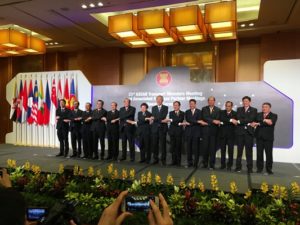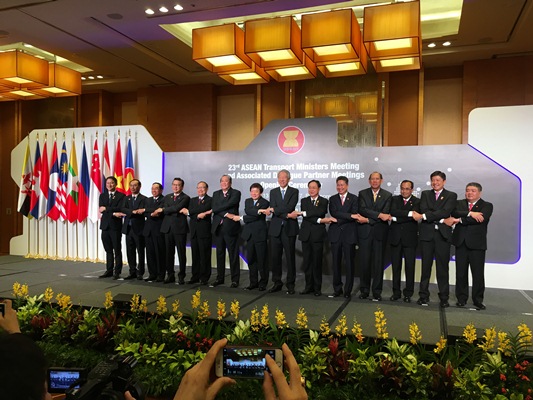 At the 23rd ASEAN Transport Ministers Meeting on October 12, the region’s transport officials signed five and adopted six initiatives to enhance transport cooperation among ASEAN member states (AMSs) and with their dialogue partners, according to Singapore’s Ministry of Transport.
At the 23rd ASEAN Transport Ministers Meeting on October 12, the region’s transport officials signed five and adopted six initiatives to enhance transport cooperation among ASEAN member states (AMSs) and with their dialogue partners, according to Singapore’s Ministry of Transport.
The initiatives include those intended to further liberalize air services in the region, improve the safety and efficiency of air travel in ASEAN, and facilitate the seamless cross-border movement of passengers, said the ministry.
The ASEAN ministers adopted the ASEAN Air Traffic Management Master Plan to support the establishment of the Seamless ASEAN Sky (SAS). The SAS aims to facilitate a more integrated and harmonious flow of aircraft across ASEAN to realize an increase in airspace capacity, resulting in reduced delays, reduced operational costs for airlines, and enhanced safety of air traffic management.
Also signed were two agreements to liberalize air services in the region. The first is Protocol 3 on domestic code-share rights between points within the territory of any other ASEAN member states. This agreement will enable ASEAN carriers to expand their international networks without deploying their own aircraft, increase network coverage to markets where the traffic potential is thin, and eventually build up market awareness and demand for direct linkages.
Tenth package of service commitments signed
The second agreement is the Protocol to Implement the Tenth Package of Commitments under the ASEAN Framework Agreement on Services. This agreement seeks to progressively reduce restrictions on trade in air transport ancillary services within ASEAN.
To facilitate aviation growth and development, the ministers signed the Mutual Recognition Arrangement on Flight Crew Licensing, which is a key safety initiative under the ASEAN Transport Strategic Plan 2016-2025. The first mutual recognition arrangement in the ASEAN for aviation personnel, the agreement will ease the validation or conversion of licenses issued by one AMS to another.
To further improve the safety of air travel, ASEAN transport ministers have made a good start on the ASEAN Foreign Operator Safety Assessment (AFOSA) program. AFOSA is another key safety initiative involving the sharing and analysis of data from ramp inspections conducted on foreign aircraft among AMSs.
The ministers also signed the ASEAN Framework Agreement on the Facilitation of Cross Border Transport of Passengers by Road Vehicles, which will make it easier for buses and coaches from one ASEAN country to enter another ASEAN country.
ACTS implementation
Meanwhile, the ministers noted the completion of the parallel run of the ASEAN Customs Transit System (ACTS) Pilot conducted in ACTS pilot countries, and called for the ratification of all protocols to the ASEAN Framework Agreement on the Facilitation of Goods in Transit in order to fully implement the ACTS, according to the joint ministerial statement of the ASEAN transport officials.
The ministers also welcomed the successful launching of the ASEAN Roll-on Roll-off (RORO) Sea Linkage Route between Davao-General Santos (the Philippines)-Bitung (Indonesia) on April 30, 2017. Similarly, they welcomed the scheduled launch in 2019 of the RORO ferry service between Dumai, Indonesia and Melaka, Malaysia.
Likewise lauded was the finalization of Disaster Prevention and Mitigation Guidelines for Ports in ASEAN, which provides basic ideas for improving disaster prevention and mitigation measures in each ASEAN member state.
The ministers are also looking forward to finalizing the draft MOU on improving safety standards and ship inspection for non-convention ships (NCS) in the ASEAN and the guidelines for safety standards of NCS in the region, the MOU targeted to be signed in 2018.
ASEAN’s dialogue partners
On ASEAN’s transport accords with dialogue partners, the ministers welcomed new initiatives under the ASEAN-Japan Transport Partnership, which include the ASEAN-Japan cold chain logistics project; development of guidelines for maintenance of navigation channels in ASEAN; and development of guidelines for safety measures with ships’ routing. The ministers also noted the progress of negotiations on an ASEAN-Japan Air Services Agreement.
The ministers also welcomed the growth in air connectivity between ASEAN and China with the implementation of the ASEAN-China Air Transport Agreement and its Protocols 1 and 2. The ministers encouraged the timely conclusion of an agreement to further expand 5th freedom traffic rights in 2018, and the eventual achievement of an ASEAN-China Open Skies.
At the same time, the ministers acknowledged the steady progress made to implement the ASEAN-Republic of Korea Transport Cooperation Roadmap and encouraged continued dialogue with South Korea to conclude an early bilateral air services pact.
The ministers supported the strengthening of transport connectivity with India and looked forward to the speedy conclusion of both ASEAN-India Air Transport Agreement and ASEAN-India Maritime Transport Agreement.
They welcomed the adoption of a work plan to implement the ASEAN-U.S. Aviation Cooperation. The cooperation will focus on economic regulation, safety, efficiency, harmonization, and aviation security.
Finally, the ministers expressed pleasure with the ongoing negotiations on an ASEAN-EU Comprehensive Air Transport Agreement, saying fast-tracking talks would benefit more than 1 billion people in ASEAN and the EU.
Photo courtesy of ASEAN





